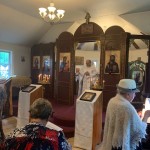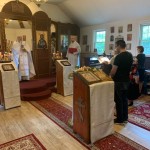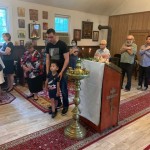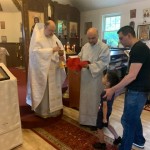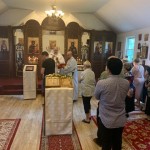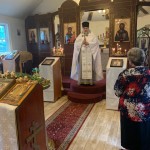On August 23, on the 11th Sunday after Pentecost, Rector of St. George Church, Archpriest Igor Tarasov headed the Divine Liturgy at our parish temple. After the Gospel lesson he preached the following homily in English:
“Dear brothers and sisters! Today the readings from the Epistle and the Gospel are dealing with material goods. And if the Gospel lesson is telling us a parable, so the money and the debts described there are symbolic, in today’s Epistle Holy Apostle Paul is talking about real things, about temporary goods and compensations. Therefore, we may commemorate today’s Saint, Holy Martyr Lawrence. St. Lawrence was an archdeacon of the Roman Church in the early centuries and the bishop, the pope of Rome placed him in charge of the Church treasury, over the Church belongings. During the persecutions, when the pope was martyred, he blessed St. Lawrence to distribute the treasures among the poor. Later the Emperor summoned Lawrence and wished to seize the Church property and treasures. But the Saint called the beggars, the poor people of Rome to come over and said to the Emperor, “Here are our treasures!” Then St. Lawrence had been tortured and died as a Martyr for Christ. He was finally burned on the grill.”
“Remembering that example of a Saint’s life, we may now begin to speak about today’s Gospel lesson which tells us about the money and the debt but those things should be understood rather symbolically. The lesson tells us a parable about a cruel and unmerciful lender who himself owed ten thousand talents to the king, but did not wish to forgive his fellow servant a debt of one hundred denarii.”
“This parable teaches us how kind and merciful is our Lord. In this parable He is shown as a kind king who forgives a large debt and releases his servant. The servants in the parable are us, people. We are the servants of God. And our Lord constantly forgives us our debts, our transgressions. We have a lot of them in our life. Just think how many sins a person commits during the lifetime? But if he or she sincerely repents and asks forgiveness, God in His compassion forgives all of them. However, the compassionate Lord is expecting from us a similar compassion towards our neighbors, all other people. It is no accident that the Lord’s Prayer has the words: “and forgive us our debts, as we forgive our debtors”. God’s forgiveness of our sins depends on our forgiveness of the sins of others against us. If we will act like an unmerciful servant, the Lord will justly condemn us for our transgressions. And our Lord finishes the parable with the words: “So My Heavenly Father also will do to you if each of you, from his heart, does not forgive his brother his trespasses” (Mt. 18, 35)”.
“Unfortunately, we do not always remember that God’s command to forgive from our heart the trespasses of our brothers. During the course of our lifetime we may see many times how people fight, argue and hate each other because of the fact that someone offended someone and there is no forgiveness. Some people do not wish to forgive. It is sad, but they may finally receive a due condemnation from our Lord at the Last Judgment”.
“We should also note the huge difference between our trespasses against God and the trespasses of our neighbors against us. We commit sins every day. And every sin is an offense of God’s majesty, His infinite goodness. Thus we owe God the whole lifetime. And our lifetime is full of sins, full of lesser or greater transgressions. At the same time, another servant owed his fellow servant one hundred denarii. And that was an average wage for one hundred days of labor. Perhaps, it was much, but it may not be compared to ten thousand talents owed to the king. Ten thousand talents was a very large amount of money, the amount someone could never earn even in the course of a lifetime! But we often make a big deal out of trespasses of our brothers against and do not wish to forgive. God forgives us terrible iniquities while we do not wish to forgive insignificant shortcomings”.
“An example could be how some people carelessly omit the church services. It is not a very direct example, but it does illustrate how different are our trespasses against the Lord and the trespasses of other people against us. Many religious people easily miss the church services, even Sunday Liturgy. Of course, may have an excuse if they are busy, if they are working or got sick. But in many instances our parishes suffer when people who belong to them, do not show up as they should. We owe to God our keeping of the Commandment to sanctify the Lord’s Day. All of us owe Him participation in His Mystical Supper. But many seem not to realize that. However, if someone did not come to those people on the occasion of their personal celebration, they would be offended. They would be not easy to forgive. Some may not forgive at all – depending on a personality. But God forgives us our trespasses if we do repent.”
“Thus, having in mind the parable on a merciful king and unmerciful servant, let us be understanding towards the shortcomings of our neighbors and forgive them their trespasses. For God forgives us ours. Let us be compassionate towards other people and excuse their defects. For God excuses our shortcomings and forgives us. Let us be kind and forgive if our neighbors offend us. For the Lord is kind and forgives the offenses and iniquities we commit against Him if we repent. Let us do that, so the Lord may be merciful to us and forgive us our debts as we forgive our debtors”.
During the Litany of Fervent Supplication, Fr. Igor proclaimed a petition beseeching the Lord to spare the faithful from the outbreak of the disease.
The choir nicely performed Psalm 33 and a hymn to the Most Holy Theotokos during preparation for Holy Communion.
After the dismissal of the Liturgy the Rector made some announcements.
Following the Liturgy Fr. Igor performed a memorial Litia on the request of Tatiana Migal to commemorate her deceased relatives. Then the Rector engaged in conversation with some of our parishioners.

